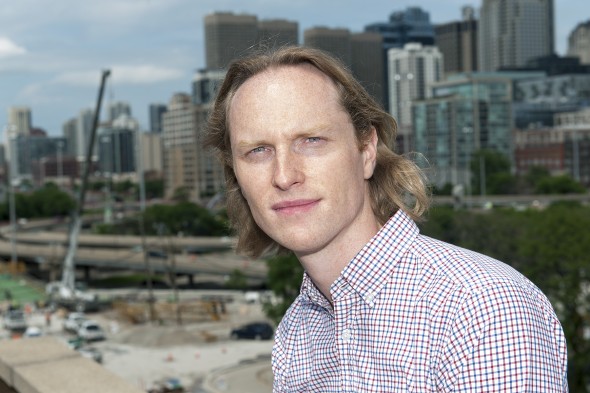Re-thinking design to build sustainable cities

“We are now under serious pressure to reduce our carbon footprint and this can only happen if we change the way we collect, distribute and dispose of energy and resources we consume,” says Sybil Derrible. Photo: Roberta Dupuis-Devlin/UIC Photo Services
Sybil Derrible does research aimed at making cities both sustainable and resilient.
His purpose is to better integrate infrastructure systems. “The whole goal is to design cities in a different way,” said Derrible, assistant professor of civil and materials engineering and research assistant professor at UIC’s Institute for Environment Science and Policy.
“We are now under serious pressure to reduce our carbon footprint,” he said, “and this can only happen if we change the way we collect, distribute and dispose of the energy and resources that we consume every day.” He quotes Einstein: “We can’t solve problems by using the same kind of thinking we used when we created them.”
One way of doing this is to better understand how cities function in the first place.
He argues for better integration between the various authorities. “Streets, for instance, should not only be designed by transportation engineers, but also by water engineers,” he said. “This is especially relevant in Chicago, where many streets flood each time it rains.”
Derrible talked about the three Ph.D. students he’s supervising and what he’s working on with them.
Graduate student Amirhassan Kermanshah is studying the resilience of transportation in the face of extreme weather events. “What happens in a flood, hurricane or ice storm, and how do you simulate them?” Derrible said. They’re using 13 sophisticated climate — not weather — models to figure out patterns to the year 2100.
The idea is to think about the future impact on cities — their road networks, for example. “There’s no way we can predict extreme events,” Derrible said. “But we know we will have them, so we might as well be prepared for when they happen.”
Graduate student Sk Nasir Ahmid is using World Bank data to track resource consumption patterns around the world. “What we are trying to do is to group countries together and identify best practices,” Derrible said. “If two countries’ GDP [gross domestic product] are up and their energy use is up, but for CO2 emissions, one went up and the other went down, we want to see why. Eventually this will enable us to make some predictions about trends in resource consumption.”
Graduate student John Mulrow is redefining urban food systems. “One thing that urban agriculture lacks is industrial symbiosis, so that the waste of one industry becomes a source of another,” Derrible said.
One example is at The Plant, a business incubator at 1400 W. 46th St., where one process uses fish poop to grow plants. Mulrow is a former interim executive director of The Plant who left to come to UIC.
Derrible grew up in the archipelago of St. Pierre and Miquelon, a French-owned territory off the coast of Newfoundland. He studied mechanical engineering at the Imperial College London, earning first-class honors. He received the equivalent of a master’s degree in industrial engineering at Ecole Centrale de Lyon, France, where he met his future wife, Marie-Agathe Simonetti.
He earned a Ph.D. in civil engineering at the University of Toronto. He joined UIC in 2012 and lives in Lakeview. Because his wife’s field is art history (she is a graduate student at UIC), they often visit art museums. The couple also travels a lot. In 2011-2012, while he was a visiting research fellow with SMART (Singapore-MIT Alliance for Research and Technology), they saw Malaysia, Indonesia, Thailand, Vietnam, Cambodia and Hong Kong.
Last year they were in Korea and the Philippines, and this year they plan a trip to Japan. They’ve been all over Europe, the United States and Canada.
Now, about his name. In the U.S., many assume he’s female because of his first name, Sybil, and his middle name, Jean-Marie. However, in French, the female versions of the name are Sybille and Jeanne.
“When I added my wife to my medical plan, they put us down as a civil union,” Derrible said.
Categories
Topics
